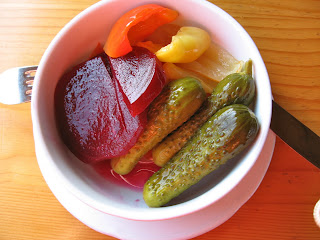Dear reader, you find me once again in the Palace Hotel Zagreb, in the same room (number 429) in which I awaited Arlequino’s arrival and, to pass the time and to fulfill my visiting professor duties, marked the students’ final exams. I am feeling rather sentimental and again ambivalent. Now that the time to leave is nigh, I am ready to go. But my time here in Croatia has flown by, and I reached a level of comfort in this country that I had not expected. Coming back to Zagreb today felt like coming to a home, one of many I have lived in.
I have traveled to most parts of the country—Osijek in the east; Porec, Pula and Rovinj in Istria, Plitvice in the centre, Zadar, Split, Hvar and Dubrovnik on the coast. And I have learned many things about Croatia and Croatians and even some of their language—okay, not that much, but I have learned how to say polite things, how to order meals and drinks, how to count. My attempts to speak even a few words of Croatian have been generally appreciated. “Bravo!” said the lady who cooked our lunch in Split the other day (the same lady who told Arlequino that he was not allowed to order the cevapi but had to eat the roasted veal that was fresh and “super” instead). But today when I ordered a pivo, some university student at the next table mocked me. Oh, well.
Things I have learned:
- Unexpectedly, my knowledge of the German language has often come in handy. The older generation are more likely to have German as a second language than English, a leftover from being part of the Austro-Hungarian empire. The young people all speak English. I read somewhere that if you need help, ask a teenager, and that has been consistently true.
- Television: on the Croatian stations they frequently show movies or drama series (such as Law and Order) in the original, with Croatian subtitles. This, in part, accounts for the immersion in “English” culture of the young.
- Television: Turkish soap operas are so popular that Croatians are taking more holidays in Turkey and even going to Turkish language classes.
- The wines are very good: Posip (white) and Plavac (red) from Dalmatia are particular favourites of mine now. Note to LCBO: why don’t you stock more Croatian wine?
- In every single bar, café, bus or train station and restaurant, you could eat off the floors of the washrooms, they are that spotlessly clean.
- The loyalty to the convicted generals is strong, but our intellectual friends say that it is time to move on—and join the EU. The indictment of the generals who led an attack on Serbs in Croatia during the civil war was a precondition of being considered for entry into the EU. But there is mixed feeling about whether or not that step would be better for Croatia. This country, as I’ve said before, is strong in its sense of self.
- This is a very monochromatic place. There are regional, religious, and some ethnic differences, but man-o-man, it’s white.
- No one told us this beforehand, but when we were driving to Dubrovnik we went through Bosnia-Herzogovina. They got 9 km of the coast. One port town.
- Croatia was not really on my mental map of Europe before I came here. Why not? Even in my twenties when I was backpacking around Europe it never occurred to me to travel to (then) Yugoslavia. Why not?
- Cobblestones and cracked pavement ruin shoes.
- The practiced eye of my paramour determines that Croatia is the least sleazy country in Europe
- The Croatians have not messed around with their food as much as we have. Right now it is strawberry season, and there are stands all over the city where you can buy some straight from the farm. And the strawberries are glossy with freshness; they have the right combination of sweetness and tartness. As Arlequino said, “they taste like how strawberries used to taste.”
- The country is small, but the regions are so very diverse, both culturally and geographicaly. Istria feels Italian. The Dalmatian coast feels Greek. The interior is mountainous and densely forested—we drove through many tunnels and across vast canyons. Parts of the land have been swept clean of vegetation—the Venetians cut down the trees to build their boats and buildings and the top soil blew away when the strong Bora winds came.
I’m sure there is much more …







































